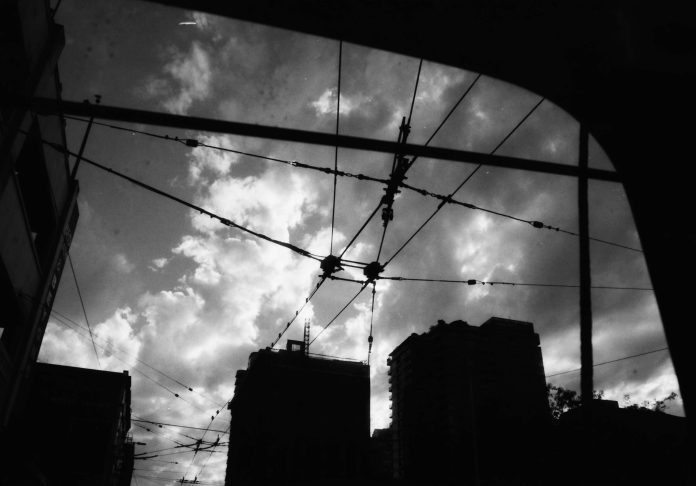“Merry Christmas, happy holidays, all that good stuff,” I call out to my ragtag crew. We are the nighttime 7 and we’ve just boarded the crowd from NightWatch, the shelter dispersal program on the east edge of Vietnamtown.
It’s a good group, these guys.
They may not look it, shuffling aboard at their own pace, perfumed with the halo of residue-stiffened layers and aged by the clash of hope and time—but they are. The rank-and-file wage earners are long since in bed by now, and I’ve driven home the swing shift people already; we’re the leftovers, keeping time because someone’s got to, visible now because there’s no one else around. My bus, humming with activity on an otherwise desolate street, feels simultaneously like the forgotten corner of a dying democracy…and the hard leading edge of contemporary urban existence, immediate, vivacious, absolute. No need to be anywhere else.
NightWatch’s structure demands a level of planning and responsibility that weeds out certain attitudes. You have to procure a ticket at an office downtown during the day, figure out how to get from there to the NightWatch building and then do so when it opens in the evening, retain the previously procured ticket to gain entrance, ask for and receive another ticket guaranteeing you a bed in an area shelter, which you then commute to, using a third bus ticket they’ll have given you. It’s complicated. The resulting group who uses the service has the mental health and aptitude to take on the task.
I’m not expecting much in the way of a response to my holiday well wishes, but they double down on appreciative whoops and hollers. They’re surprised by my enthusiasm, and the other passengers are in turn surprised by theirs.
“Hopefully they had an extra good meal at NightWatch tonight,” I say to the fellow nearest me. It’s Christmas Eve.
Kevin, the erudite street denizen you know from this earlier post, stands near his repurposed stroller-as-wheelbarrow and asks politely, through the grit and grime of his appearance, “and how are you, good sir?”
“Really well,” I reply. “I’m happy to be here. I’m glad NightWatch was still open today for you fine folks.”
Sometimes I wonder if people know I’m being serious. Do they think I’m being sarcastic? When you’re already at the level of complete honesty, you have no further recourse for authenticity. You’re already being as genuine as possible. You can do things like paraphrase yourself or make hand gestures, but you really just have to trust that they’ll somehow read your legitimacy. I said what I said, realizing I might have sounded awfully snarky, but trusted their ability to read me.
At that moment a fellow with a cap elbowed forward with a freewheeling grin. Could’ve been a truck driver, construction, utility and electrical: you know the type. The American man too quickly aged by his work, the hands-on service jobs that wear their employees like a cloak, hard hats and stubble and cold beer, joints that ache in the night. How does he smile through it all? How much of me is him, and will I be able to grin as well?
“Hey,” he said. “I love what you’re doing.”
“Yeah?”
“You’re doing the Kandinsky Method.”
“Oh yeah?”
“Yeah, it’s a new thing in psychology. Where you’re like not quite cheesy, but still hella cool at the same time…”
“Like, sincere?”
“Hell yeah, sincere! Like almost corny, but just straight up, and it ends up being highly connectible and super badass. Kandinsky, he was this painter,”
“Yeah, the abstract guy! I’ma have to check this guy out!”
“You really should, it’s really gangster!”
I breathed a sigh of relief. This guy didn’t just get me, he got it. The whole thing. Kind truthfulness so unconcerned with appearances it paradoxically ends up becoming hugely attractive.
As he retreated to join his friends, Kevin piped up: “too bad you don’t get credits, or a certificate! It’s like a class out here.”
“You know, I went to university, but I learn more out here. It’s just so much bigger out here.”
“Well, think about it. In a classroom you have what, maybe forty-one, forty-two people tops. Including the teacher.”
“And they’re probably from comparable backgrounds,”
“Whereas out here you’ve got hundreds. Different hundreds, every day!”
“Thousands, I’d say! From all walks of life. It’s just incalculable.”
It’s a learning experience, certainly, but it’s self-directed to a nigh overwhelming degree. When the stimuli are this varied and all encompassing, you only see what you look for. You can pay as much or as little attention to whatever you want, and walk away with lessons the diametric opposite of your colleague who’s exposed to the same.
“And, you get paid!” Kevin was saying.
Which I’m thankful for. But that’s not the best part of all this. The best part of all this is getting to spend time out here with the folks and build something positive, take away something truthful to fold up in my pocket and save for later, that I might remember all that was good on the eastern outskirts of downtown, when people are deploring the less fortunate.
I took the green light, chuckling to myself. “Highly connectible and super badass.” “Really gangster.” Wassily Kandinsky, don’t roll over in your 1944 Neuilly sur-Seine grave! We get your general idea. Look past the verbiage!
Nathan Vass is an artist, filmmaker, photographer, and author by day, and a Metro bus driver by night, where his community-building work has been showcased on TED, NPR, The Seattle Times, KING 5 and landed him a spot on Seattle Magazine’s 2018 list of the 35 Most Influential People in Seattle. He has shown in over forty photography shows is also the director of nine films, six of which have shown at festivals, and one of which premiered at Henry Art Gallery. His book, The Lines That Make Us, is a Seattle bestseller and 2019 WA State Book Awards finalist.


